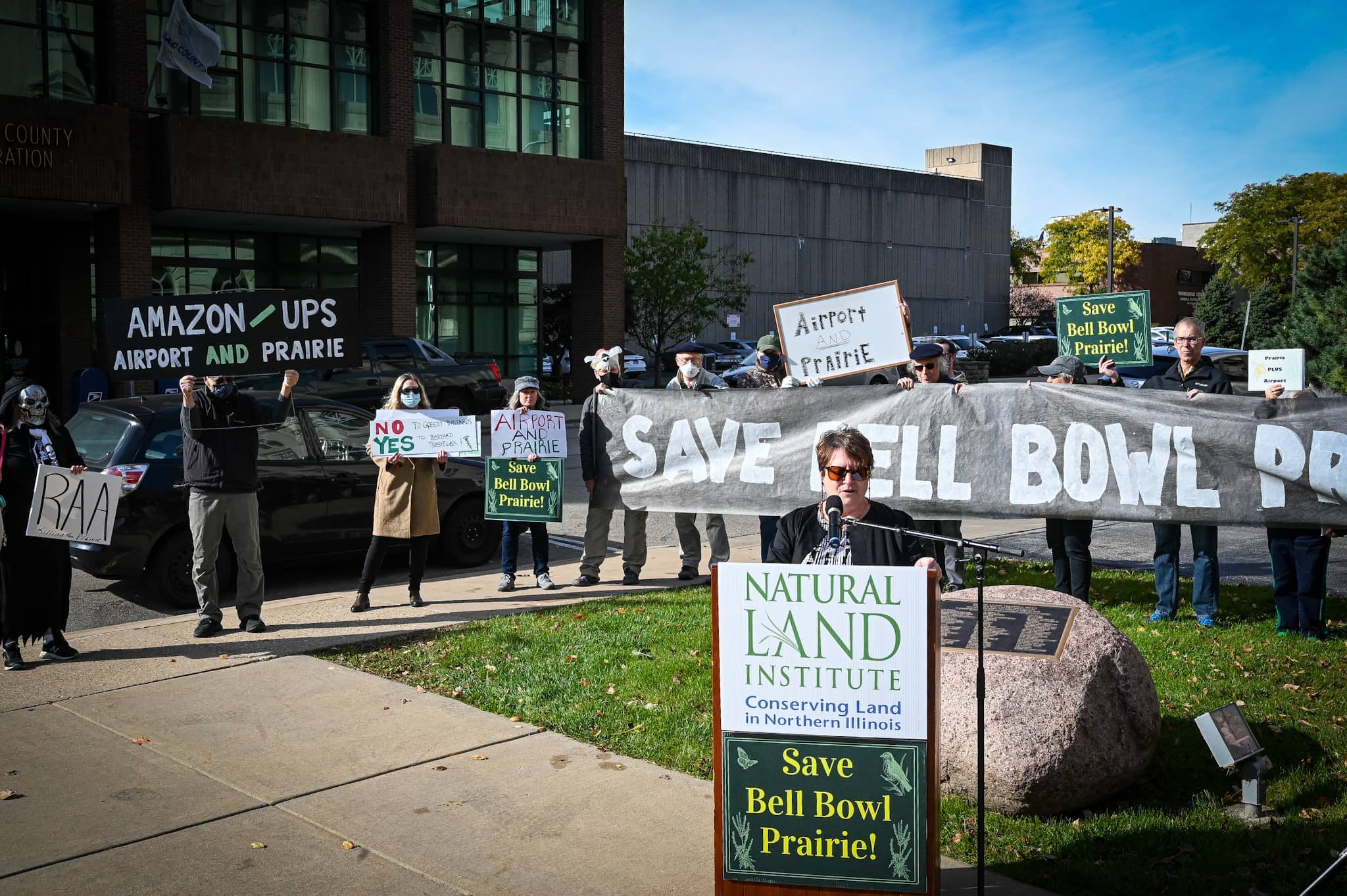 Kerry Leigh, executive director of Natural Land Institute, announces a federal lawsuit Oct. 27, 2021, aimed at stopping Rockford airport expansion. On Tuesday, Nov. 2, 2021, she provided an update during a public meeting of Save Bell Bowl Prairie. (Photo by Kevin Haas/Rock River Current)
Kerry Leigh, executive director of Natural Land Institute, announces a federal lawsuit Oct. 27, 2021, aimed at stopping Rockford airport expansion. On Tuesday, Nov. 2, 2021, she provided an update during a public meeting of Save Bell Bowl Prairie. (Photo by Kevin Haas/Rock River Current)By Kevin Haas
Rock River Current
Get our newsletter
ROCKFORD — The Natural Land Institute is moving forward with its lawsuit against the Chicago Rockford International Airport after the airport agreed last week to hold off on construction inside Bell Bowl Prairie until March 1.
The nonprofit’s agreement with the airport, which was reached within 24 hours after the federal lawsuit was filed, allows the Natural Land Institute to refile its injunction if it’s not satisfied with the airport’s response.
Meanwhile, other portions of the lawsuit will move forward as the organization attempts to gain access to the land, investigate how the previous environmental assessment was conducted and permanently preserve the prairie.
Related: ‘We have to keep caring’: Group develops next steps to save Bell Bowl Prairie
Kerry Leigh, executive director of the Natural Land Institute, provided an overview of the next steps in the lawsuit Tuesday during a public meeting of the Save Bell Bowl Prairie Group. Here’s a recap of what she said happens next:
Service
Natural Land Institute still has to complete its service, the process of personally notifying those named in the lawsuit, on all defendants, Leigh said.
Among those still to be served are U.S. Secretary of Transportation Pete Buttigieg, Illinois Secretary of Transportation Omer Osman, Federal Aviation Administration administrator Steve Dickson, U.S. Secretary of the Interior Deb Haaland, U.S. Fish and Wildlife Service Director Martha Williams and Mike Dunn, executive director of the Chicago Rockford International Airport.
Defendants have 21 days to respond to the suit once served, or 60 days in the case of the federal defendants, Leigh said.
“As we wait for their responses we are going to continue to demand access to Bell Bowl Prairie in order to monitor its preservation pursuant to the agreement with the airport authority,” Leigh said.
Discovery
The institute will seek all documents related to the airport expansion during discovery, Leigh said.
“We have done some (Freedom of Information Act) requests, of course … but we feel there is some discovery that has not been shared,” Leigh said. “So we want to dig deeper.”
One thing the organization hopes to learn more about is environmental site assessment that was conducted in November 2019. The airport received a finding of “no significant impact,” allowing it to go forward with construction.
Leigh said the assessment was “woefully inaccurate,” and that they will send a notice of intent to sue to the U.S. Department of the Interior and the U.S. Fish and Wildlife Service.
Leigh also said they learned that the airport only consulted with the Illinois Department of Natural Resources and the Fish and Wildlife Service on the construction of the road. “They did not consult on any of the rest of the destruction of the prairie,” she said.
The institute wants to see an expanded consultation process and environmental review before any more work in the prairie is done.
“We’re going to try and find out what that process is going to look like,” she said. “We still have a lot of gray areas around that consultation process.”
What’s next
Once discovery is complete, depositions of the parties will begin in what promises to be a lengthy process.
The court would then issue a schedule for trial if no agreement is met.
This article is by Kevin Haas. Email him at khaas@rockrivercurrent.com or follow him on Twitter at @KevinMHaas.